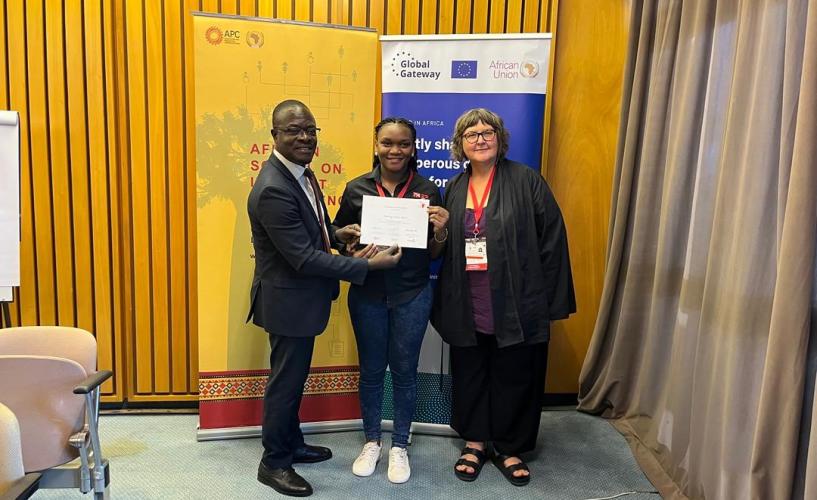
In the heart of Addis Ababa, Ethiopia, from 14 to 19 November 2024, the African School on Internet Governance (AfriSIG) became a melting pot of ideas, collaboration and strategy, bringing together change makers from across the continent. This was not merely a conference; it was an unparalleled learning and networking opportunity that brought together stakeholders from over 16 African countries. The participants were as diverse as the continent itself, with voices from civil society, the technical community, academia, government, media, the private sector, and even members of parliament − including my role as the representative for trade from South Africa during the practicum.
This year’s AfriSIG stood out for its focus on critical issues like the African Continental Free Trade Area (AfCFTA) Protocol on Digital Trade and the African Union Data Policy Framework (AUDPF). The sessions sparked meaningful dialogue around the complexities of harmonising the Digital Trade Protocol with the AU Data Policy Framework. Together, as a cohort, we engaged in collaborative exercises to propose actionable strategies for alignment and effective implementation, contributing to a broader understanding of regional digital integration. I eagerly anticipate the publication of the AfriSIG 2024 outcome document, which will encapsulate these efforts.
The power of the practicum
A highlight of AfriSIG 2024 was the practicum − a hands-on simulation designed to foster multistakeholder negotiations. This year, the exercise was centred on drafting recommendations to address the gaps between the AfCFTA Protocol and the AUDPF. Participants were assigned roles across various sectors, often outside their usual expertise, to simulate the dynamics of policy making and consensus building in the real world.
Representing a member of parliament for trade from South Africa during this simulation was both challenging and enlightening. It required stepping into a policy maker’s shoes to defend national trade interests while balancing the broader vision of a unified and inclusive digital Africa. This experience underscored the complexities of finding common ground among diverse stakeholders and demonstrated the value of dialogue, compromise and strategic advocacy.
Empowering advocacy in the digital age
As a queer advocate and communications and advocacy lead at HER Internet, I found AfriSIG 2024 to be an empowering space. The discussions reaffirmed the importance of inclusivity in digital governance frameworks, particularly for marginalised groups often left out of policy considerations. My contributions to the conversations emphasised the need for equitable access to digital technologies, gender-sensitive data governance policies, and recognition of the unique challenges faced by structurally silenced communities in navigating digital spaces.
AfriSIG also served as a platform to deepen my understanding of how frameworks like the AfCFTA Protocol can impact digital trade and economic opportunities across Africa. By leveraging these learnings, I aim to amplify the voices of underrepresented groups and ensure that digital rights frameworks are both inclusive and actionable.
A transformative experience
Beyond the intellectual rigour, AfriSIG fostered a sense of community and collaboration. The vibrant mix of faculty and fellows brought a wealth of experience and perspectives, sparking dynamic debates and innovative ideas. It was inspiring to witness how shared goals for digital equity can transcend borders and disciplines.
Leaving Addis Ababa, I carried not only the lessons learned but also a renewed conviction that Africa’s digital future is brimming with promise. AfriSIG 2024 demonstrated that with collective action, the continent can lead the way in shaping inclusive and sustainable internet governance systems. As we await the outcomes of this year’s deliberations, I remain committed to advocating for a safe and equitable internet for all − where every voice is heard, and no one is left behind.
Mulungi Sanyu Agnes is a dedicated advocate for digital rights and internet freedoms, focusing on the needs of structurally silenced women in Uganda. Currently, she serves as the communications and advocacy department lead at HER Internet, a feminist-led organisation committed to fostering inclusive digital spaces.
